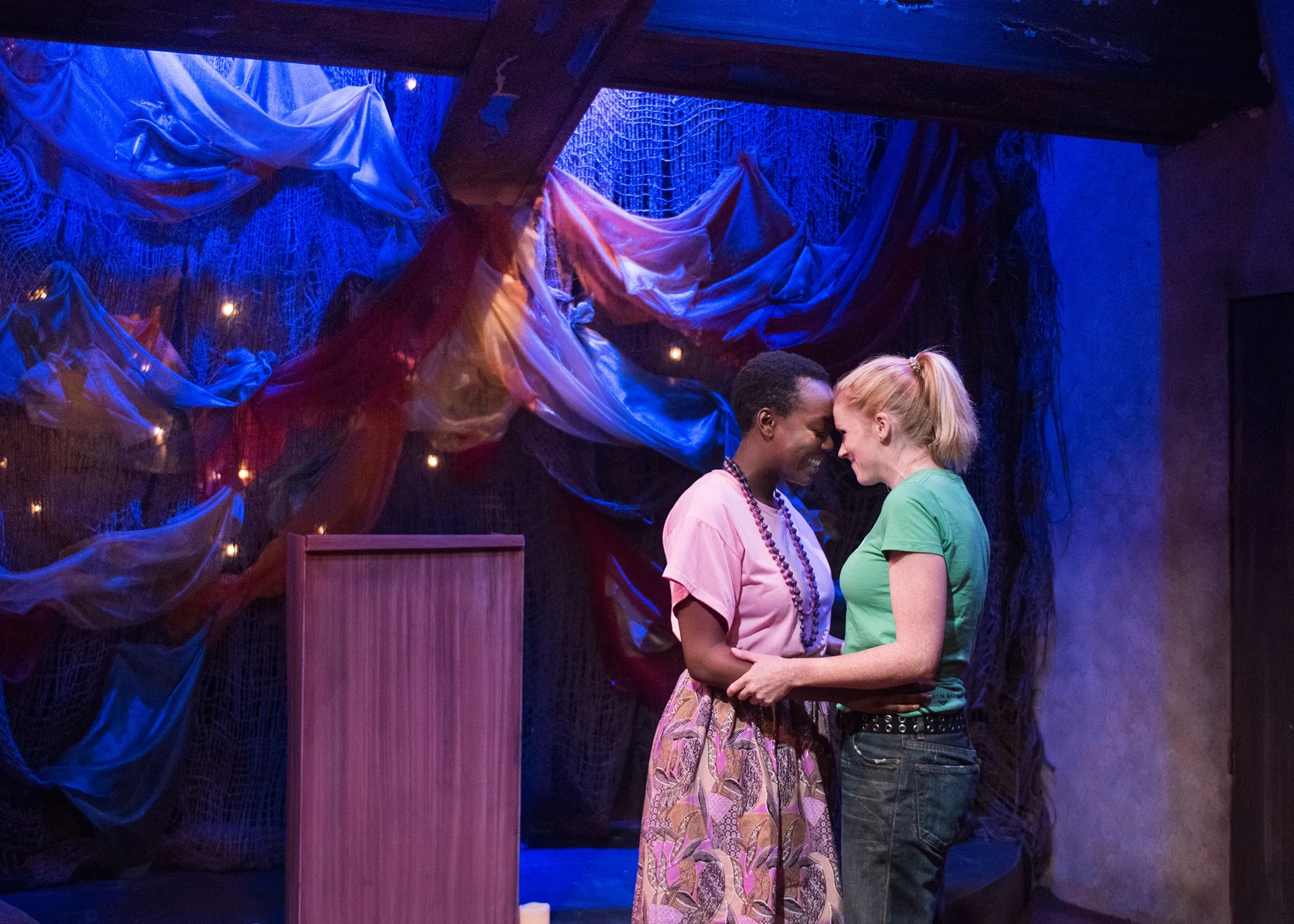New Conservatory Theatre Center presents Hansol Jung’s “Cardboard Piano” in the heart of San Francisco. Taking us back to northern Uganda in 1999, we meet the young Adiel (Gabriella Momah ’15) and Chris (Megan Timpane) — a black woman and white woman, respectively — who are lesbians in love. However, any sort of queer behavior is outlawed — not even to mention marriage, which is what Adiel and Chris want to do. And wed they do, but not before their happy day is interrupted by a child soldier running from his commanding officer due to the ongoing war. Put simply, Hansol Jung makes good, engaging, intelligent, thought-provoking queer theater.
The eponymous paper pulp instrument in the name is a bit of a heavy-handed metaphor, but it ultimately serves a larger purpose. Christ tells the story about her father, who gave her a cardboard piano after the young Chris asked for a real piano; however, the story is dangerously distorted beyond her control and acts as a painful reminder of her past. Separated into two distinct acts, it’s only clear how the two sections of “Cardboard Piano” connect about halfway through the second act, 15 years later, when Chris returns to Uganda and encounters people from that fateful night.
“Cardboard Piano” rides out on extraordinarily strong performances from all four members of the cast, including Momah, Timpane, Howard Johnson (who plays the young child soldier) and Dane Troy (who plays the commanding officer and a second act main character). Where Jung’s lengthy, introspective monologues have the potential to drag on into expositional territory, the actors imbue each with life.
It’s honestly tough to tell where “Cardboard Piano” tries to go until the very last moments of the first act — and then Jung slaps you right in the face. It’s a forbidden, star-crossed lovers kind of story — tender and sweet, understandably possible, a tragedy waiting to happen. However, it’s only a play like this that can do the impossible — force the audience in completely blind after the first act.
When we’re taken out of 1999 Uganda and only from the program do we realize that the play jumps to 2014, it’s nearly impossible to predict what will happen. All I can say is that it’s a slow, devastating realization, a journey that you take along with the characters that ends in an inevitable, melancholy end. The first act drags for a bit before Adiel and Chris are interrupted, but before then, it’s a bubbly, nearly-peachy keen occasion interrupted with the looming fact that they will be persecuted if they come out as a couple.
The payoff from the first act only comes in the second act when everything is pieced together onstage, yet I came away wanting to know more about the historical context of the play. It’s incredibly difficult to reconcile the internalized homophobia of the characters with what happens and the recognition that overcoming this homophobia is nearly impossible in an environment that is sociopolitically suppressive. Chris struggles with reconciling what happens on her wedding night in 1999 with the humanity that lies within those bounds of a society that does not support queer liberation.
Religion also plays a particularly interesting role in “Cardboard Piano,” one that I’m still not sure how I feel. Ultimately, Jung plays more to the role of religion in the lives of individuals and how it can either act as a freeing or confining force. It’s a question that many ask today — is it fair to interpret the Bible or any other religious text word for word? Does something like that hold all the answers? Should any text really be taken word for word, or should it be interpreted and adapted as times change?
“Cardboard Piano” feels like it’s incomplete in a way — or a first draft. But maybe that’s the point — maybe there’s something we can never fulfill when seeing a tragic story like Adiel and Chris’. Maybe we’ll never get closure on something that devastates us to the core, devastates us to the point of no return. Something about feeling helpless in the face of forces greater than ourselves rang true to the entirety of “Cardboard Piano.” Now more than ever, a narrative like “Cardboard Piano” makes us confront how we perceive complicity in realms beyond the power of our mortal and human selves.
The regional premiere of “Cardboard Piano” plays at the New Conservatory Theatre Center in San Francisco through Dec. 2.
Contact Olivia Popp at oliviapopp ‘at’ stanford.edu.
